


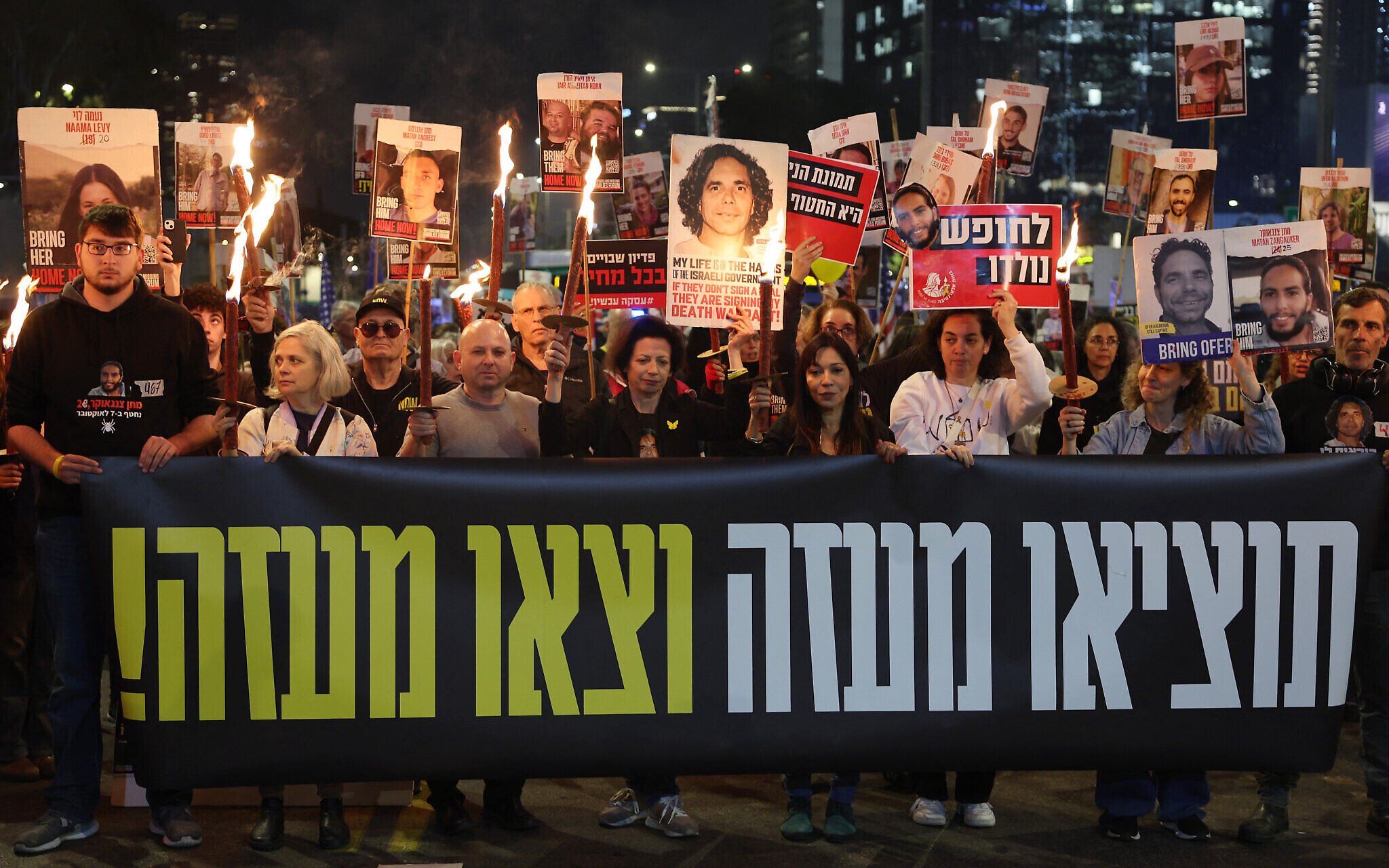
The Times of Israel is liveblogging Thursday’s events as they happen.
Islamic Jihad calls ceasefire deal ‘an honorable agreement to stop the aggression’
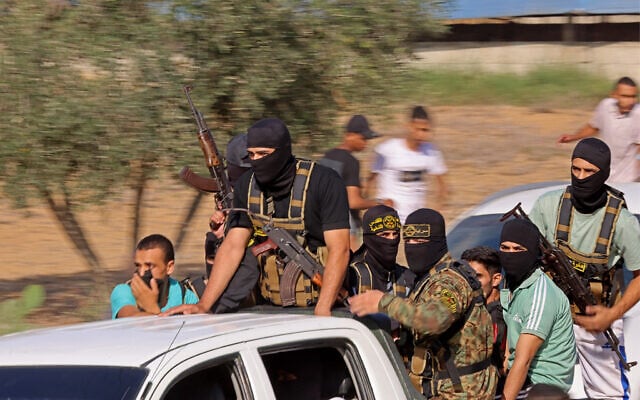
Palestinian Islamic Jihad, Gaza’s second-largest terror group after Hamas, hails the ceasefire deal as “honorable.”
Hamas had needed Islamic Jihad’s support for the deal in order to avoid a potential disruption in the process.
“Today, our people and their resistance imposed an honorable agreement to stop the aggression,” Islamic Jihad says in a statement.
The Iran-backed terror group says the deal between Israel and Hamas includes the withdrawal of Israeli forces from Gaza as well as an “honorable” prisoner exchange. It says that terror groups in Gaza “will remain vigilant to ensure the full implementation of this agreement.”
Palestinian Islamic Jihad’s fighters seized captives while taking part in the October 7, 2023, attack on Israel and have since been battling Israeli forces in Gaza.
Times of Israel staff contributed to this report.
PM’s office: Hamas seeking to dictate which Palestinian prisoners will be freed but Israel has veto
As negotiators in Doha iron out the final details of the hostage-ceasefire deal, the Prime Minister’s Office releases a statement shortly before 3:30 a.m. declaring that Israel has a veto over the release of “mass murderers who are symbols of terror.”
The statement says Hamas “is demanding to dictate the identity of these murderers” and accuses the terror group of seeking “to go back on the understandings” in the agreement.
Hamas leader touts ceasefire as a defeat for Israel while hailing Oct. 7 atrocities
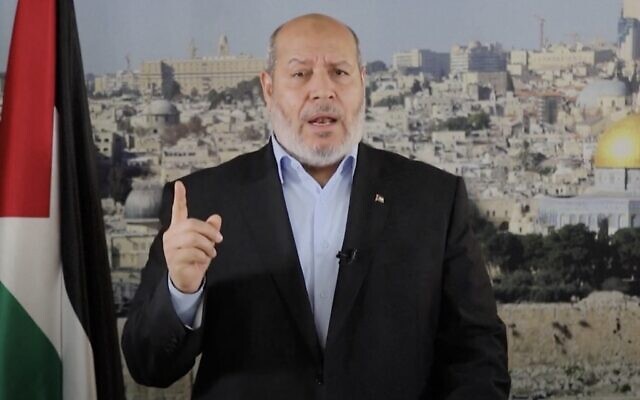
Senior Hamas leader Khalil al-Hayya says in a televised address that Israel failed to achieve its goals in Gaza, as he declares the ceasefire-hostage deal that was announced as a “historic moment” and describes it as a defeat for the Jewish state.
“Our people have thwarted the declared and hidden goals of the occupation. Today we prove that the occupation will never defeat our people and their resistance,” al-Hayya is quoted as saying by Germany’s dpa news agency.
He vows the Gaza-ruling terror group will neither forgive or forget, while praising the Hamas-led massacres of Israelis in October 2023 that started the war in Gaza as a “military accomplishment” and “a source of pride for our people,” according to a New York Times translation of his remarks.
Al-Hayya additionally hails other Iran-backed organizations such as Lebanon’s Hezbollah and the Houthi rebels in Yemen for launching solidarity attacks on Israel.
He also indicates Hamas will continue to pursue Israel’s destruction, saying the Palestinian terrorist organization will continue to look toward Jerusalem and the Al-Aqsa Mosque as a guide.
“Our enemy will never see a moment of weakness from us,” he adds.
US official says 2 American-Israeli hostages to be freed in first phase of deal
American-Israelis Keith Siegel and Sagui Dekel-Chen will be among the 33 hostages released in the first phase of the hostage deal announced today, a senior Biden administration official tells reporters.
Siegel is part of the category of elderly hostages, while Dekel-Chen was shot on October 7 and is therefore considered among the wounded. The third American hostage believed to still be alive, Edan Alexander, is a soldier, and therefore won’t be released until the second 42-day phase, but the US is committed to securing his release, the senior official says during a briefing.
The bodies of four other Americans still held in Gaza will be released in the third phase, the official says.
While the senior US official says five female IDF soldiers captured on October 7 will be released on the first day of the deal, Israeli officials later tell reporters that is not the case.
Top Biden aide seems to downplay Blinken’s claim that Hamas recruited as many fighters as it lost
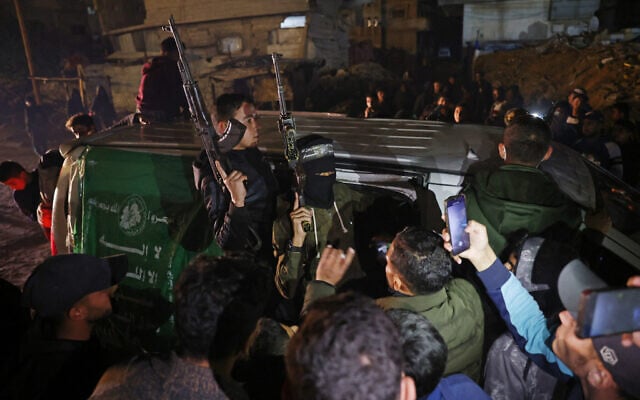
A senior Biden administration official appears to downplay a claim made by US Secretary of State Antony Blinken that Hamas has recruited roughly as many fighters as it has lost.
The senior US official was asked about Blinken’s comments during a briefing with reporters following the announcement of a Gaza hostage deal.
“I heard that, but Hamas is a significantly degraded military organization,” the official responds. “Israeli forces can go anywhere in Gaza they want. Hamas leaders are living almost entirely underground and trying to take refuge in civilian structures.”
“They really have no free-standing brigades or military organization anymore,” he says of Hamas.
“Have they recruited poor Gazans who are living in hell on earth? Yes, but that is a far cry from an organization that invaded Israel with military formations with thousands of organized fighters on October 7. Its ability to do that I really believe has been forever foreclosed,” the senior US official states.
Blinken made the comments Wednesday while arguing that Israel’s failure to stand up a viable alternative to Hamas has led the IDF to repeatedly return to places in Gaza ipreviously cleared of Hamas fighters who managed to return.
“We’ve long made the point to the Israeli government that Hamas cannot be defeated by a military campaign alone, that without a clear alternative, a post-conflict plan and a credible political horizon for the Palestinians, Hamas, or something just as abhorrent and dangerous, will grow back,” Blinken said in an address on the Biden administration’s Mideast policy at the Atlantic Council.
“That’s exactly what’s happened in northern Gaza since October 7. Each time Israel completes its military operations and pulls back Hamas, militants regroup and reemerge because there’s nothing else to fill the void,” he said. “That is a recipe for an enduring insurgency and perpetual war.”
US official says talks temporarily broke down over Hamas refusal to provide list of hostages
A senior Biden administration official briefing reporters following the announcement of a ceasefire-hostage deal says that talks broke down last month after Hamas refused to provide a list of the 33 hostages it was prepared to release in the first phase of the agreement.
Hamas asked for a one-week ceasefire in order to come up with the list, but Israel and the mediators held firm in rejecting the idea.
The terror group managed to submit a list at the end of December, which allowed talks to proceed, says the senior US official, who doesn’t go as far as to acknowledge the list does not specify which hostages are alive and which are dead.
Hamas officials claimed they lost contact with many of those holding hostages and insisted the terror group could not confirm the status of all hostages without a halt of Israeli fire.
Shortly after the list was produced by Hamas, though, Biden’s top advisers traveled to the region to jumpstart and finalize negotiations. On January 5, White House Mideast czar Brett McGurk arrived in Doha, where he has remained ever since, participating in 18 hours or more of negotiations each day, the US official says.
The talks included the drawing up of detailed maps showing Israel’s phased withdrawal from Gaza and going through lists of hundreds of Palestinian prisoners slated for potential release.
On Thursday, mediators will hold a meeting in Cairo to further discuss the deal’s implementation. Qatar’s prime minister said representatives from the three mediating countries will serve on an enforcement committee to ensure the deal is implemented properly.
After the deal was announced, US President Joe Biden and Prime Minister Benjamin Netanyahu held a warm call in which they reflected on the horrors of October 7 and the plight of the hostages as well as the joy of being able to reunite them with their families, according to the senior US official, who says Netanyahu also noted that he and Biden had experienced a significant number of historical moments throughout their 44 years knowing each other.
US official says Biden prioritized Israel’s ‘defanging’ of Hezbollah to push Hamas toward deal
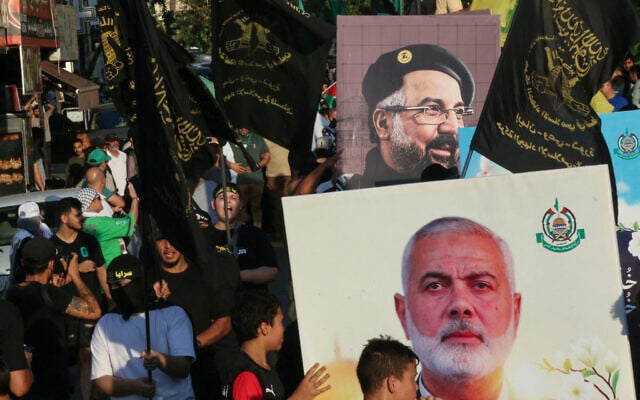
A senior Biden administration official says the US shifted its approach to the Gaza war in August, prioritizing the support of Israel “defanging” Hezbollah amid stalled negotiations for a hostage deal based on the belief that doing so would further isolate Hamas and lead the terror group to show more flexibility in the ceasefire talks.
The senior US official briefing reporters from Qatar tries to frame the Biden administration’s role as essential for bringing about the deal, but other US officials who have spoken with The Times of Israel in recent months have acknowledged that Washington did not immediately back Israel’s decision in September to massively escalate its military operations against Hezbollah. The US officials said that Israel did not give Washington a heads-up before conducting the mass detonation of communication devices that wounded thousands of Hezbollah operatives or before the IDF conducted an airstrike that killed the terror group’s leader Hassan Nasrallah.
The US did, however, begin supporting Israel’s campaign against Hezbollah after-the-fact, shelving an initiative for a 21-day ceasefire in Lebanon in late September. Once Israel finished dealing massive blows to Hezbollah group two months later, the US brokered a permanent ceasefire between Israel and the Lebanese terrorist organization.
The senior Biden official briefing reporters harkened back to the first hostage deal in November 2023, which fell apart after a week when Hamas walked back on commitments to release a number of female hostages, leading the fighting to resume.
The US sought unsuccessfully to secure short-term hostage release and ceasefire deals in the months that followed before settling on the staged framework in the spring of 2024.
The ceasefire and hostage release deal inked Wednesday is based on an Israeli proposal submitted on May 27, which was unveiled by Biden in a White House speech four days later, the senior US official says.
Negotiations were held on and off, with Hamas agreeing to the proposal at the beginning of July, while making a series of amendments.
The senior US official claims that the Hamas response was one that no Israeli government could have accepted as it was effectively an “all for all” deal that required Israel to fully withdraw from Gaza, while leaving Hamas in power. This contradicts what Israeli and Arab officials familiar with the talks have said about the Hamas offer, arguing that it was not a drastic departure from Israel’s earlier proposal.
Moreover, Israel’s negotiating team of security chiefs urged the government to accept the Hamas response at the time. However, Prime Minister Benjamin Netanyahu proceeded to add conditions regarding Israel’s withdrawal from the Strip, which led talks to breakdown, Arab, Israeli and US officials said at the time.
The US sought to revive negotiations in August, but that months-long effort fell apart after Hamas executed six hostages — including American-Israel national Hersh Goldberg-Polin — as their captors feared that IDF troops were approaching the tunnel where they were held in southern Gaza’s Rafah, the senior US official says during the briefing.
“After that, we really shifted our focus, and the strategy became… the campaign in Lebanon to defang Hezbollah,” the senior US official says. “We supported the Israelis… because as long as Hezbollah was saying it would continue to [maintain] another front against Israel… Hamas was not really under enough pressure and isolation to do the deal and release the hostages.”

It was around this time that Israeli forces managed to killed Hamas leader Yahya Sinwar in Gaza.
The senior official told reporters that already in August when the hostages were executed, the US “basically concluded that as long as Yahya Sinwar was alive, we were not going to get a deal.”
This conclusion was also what led to the shift in focus to wrapping up the northern front.
Once Israel completed many of its operational goals against Hezbollah in October, Biden’s top aides returned to the region and met with Netanyahu, who agreed to work toward a US-brokered ceasefire in Lebanon, which could then be dovetailed with a ceasefire in Gaza, the senior official recalls. The Lebanon deal was reached on November 27.
Less then two weeks later, Biden’s top aides traveled to the region to revive the negotiations and largely remained in the area until the deal was reached Wednesday.
Last week, White House Mideast envoy Brett McGurk was joined by US President-elect Donald Trump’s Mideast envoy Steve Witkoff in Doha. Their partnership was “crucial” to securing the hostage deal, says the US official briefing reporters.
Arab officials familiar with the talks told The Times of Israel it was Witkoff’s Saturday meeting with Netanyahu that led to a breakthrough in talks, with the Trump envoy leaning harder and more effectively on Netanyahu in one sitting than the Biden administration had all year.
Over the last few days, negotiations were taking place at a building in Doha, with the Israeli and American teams on the second floor, the Hamas team on the first floor and the Egyptian and Qatari teams shuttling between them, the senior US official adds.
Hamas tried to add new demands at the last minute, but “we held very firm, and we now have an agreement,” the official says.
IDF says rocket sirens in Gaza border kibbutz activated due to ‘false identification’
The military says rocket warning sirens in Kibbutz Nir Am near the Gaza border were activated due to a “false identification.”
Trump’s pick for secretary of state says sanctions on violent settlers to be lifted
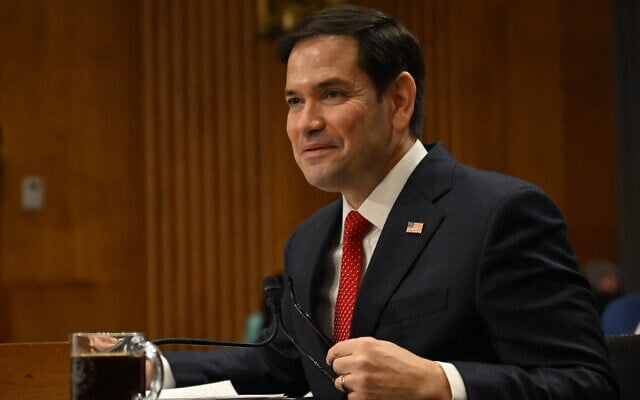
US President-elect Donald Trump’s nominee for secretary of state, Senator Marco Rubio of Florida, reveals the incoming administration will end the sanctions regime that the Biden administration rolled out last year against violent Israeli settlers.
The sanctions were unveiled amid mounting US frustration over Israel’s failure to crackdown on rampant settler violence targeting Palestinians throughout the West Bank. Seventeen individuals and 16 entities were designated in eight batches of sanctions imposed since February 2024. A handful of other Western countries have joined the US in implementing such sanctions, which have been the subject of criticism among the Israeli far-right.
Rubio is asked at his confirmation hearing before the Senate Foreign Relations Committee whether the incoming administration will reverse the policy.
“Yes,” Rubio responds before adding, “Without speaking out of turn, I’m confident in saying that President Trump’s administration will continue to be perhaps the most pro-Israel administration in American history.”
Rubio doesn’t provide a timeline for the sanction reversal, which an Israeli official speaking to The Times of Israel last month speculated could be used as leverage by the Trump administration in its ties with Jerusalem.
Rubio is also asked whether the Trump administration will cease the policy of granting waivers that allow Palestinian Authority officials to hold political meetings in Washington. Rubio responds in the affirmative.
Republican Senator Ted Cruz of Texas also asks whether Rubio will commit “to ending discriminatory policies, including Biden administration secret boycott policies against Jews in Judea and Samaria [West Bank].” Cruz doesn’t elaborate as to what he’s referring to. US President Joe Biden’s former ambassador Tom Nides visited a West Bank settlement during his tenure. The administration did maintain a de facto boycott of far-right minister Itamar Ben Gvir and Bezalel Smotrich, but did so in order to avoid legitimizing their extremist views and not because they are settlers.
Regardless, Rubio also responds to Cruz’s question in the affirmative.
PM’s office again says he won’t issue official statement on deal until ‘final details completed’
Prime Minister Benjamin Netanyahu’s office says again that the final details of the ceasefire-hostage release agreement between Israel and Hamas are still being hammered out in Doha.
An official statement from Netanyahu on the deal will only be released “after the final details of the agreement are completed, which are being worked on at this time,” the PMO says.
